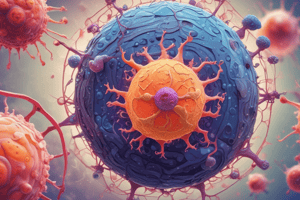Podcast
Questions and Answers
What is the primary response in seroconversion for DM Type I?
What is the primary response in seroconversion for DM Type I?
- Release of cytokines
- Activation of T cells
- Production of memory B cells
- Rapid production of IgM antibodies (correct)
In the context of acquired immunity, what characterizes passive immunity?
In the context of acquired immunity, what characterizes passive immunity?
- Development of memory B cells
- Production of antibodies after immunization
- Transfer of preformed antibodies from a donor to a recipient (correct)
- Activation of T cells after natural exposure to an antigen
What is the antibody action associated with opsonization?
What is the antibody action associated with opsonization?
- Enhanced phagocytosis of antigens (correct)
- Activation of complement system
- Neutralization of toxins
- Induction of allergic responses
Which textbook covers the topic of the HLA system?
Which textbook covers the topic of the HLA system?
In which publication can you find the article 'Misery for all seasons: Allergies, a modern epidemic'?
In which publication can you find the article 'Misery for all seasons: Allergies, a modern epidemic'?
Which textbook discusses the understanding of pathophysiology by Huether and McCance?
Which textbook discusses the understanding of pathophysiology by Huether and McCance?
Where are alveolar macrophages (dust cells) located?
Where are alveolar macrophages (dust cells) located?
Which cell type is responsible for wound healing in the proliferative phase?
Which cell type is responsible for wound healing in the proliferative phase?
What is the function of pleural macrophages?
What is the function of pleural macrophages?
Which chemical mediator induces vasodilation and bronchoconstriction?
Which chemical mediator induces vasodilation and bronchoconstriction?
Which plasma-derived protein system contains inactive enzymes (proenzymes) and is involved in inflammation?
Which plasma-derived protein system contains inactive enzymes (proenzymes) and is involved in inflammation?
What are the cellular mediators involved in inflammation which act on blood vessels, inflammatory cells, or other cells to contribute to an inflammatory response?
What are the cellular mediators involved in inflammation which act on blood vessels, inflammatory cells, or other cells to contribute to an inflammatory response?
Study Notes
Immune Response
- In seroconversion for DM Type I, the primary response is the production of autoantibodies against pancreatic islet cells.
Acquired Immunity
- Passive immunity is characterized by the transfer of antibodies or immune cells from one individual to another, providing temporary protection against infection.
Antibody Action
- Opsonization is an antibody action that marks pathogens for destruction by phagocytic cells.
Immunology Textbooks
- The HLA system is covered in the textbook "Immunobiology" by Janeway.
Allergies and Pathophysiology
- The article "Misery for all seasons: Allergies, a modern epidemic" can be found in the publication "The New Yorker".
- The textbook "Understanding Pathophysiology" by Huether and McCance discusses the understanding of pathophysiology.
Immune Cells
- Alveolar macrophages (dust cells) are located in the lungs.
- Fibroblasts are responsible for wound healing in the proliferative phase.
- Pleural macrophages function to remove debris and pathogens from the pleural space.
Inflammation
- Histamine is a chemical mediator that induces vasodilation and bronchoconstriction.
- The plasma-derived protein system known as the complement system contains inactive enzymes (proenzymes) and is involved in inflammation.
- Cellular mediators involved in inflammation include chemokines, cytokines, and eicosanoids, which act on blood vessels, inflammatory cells, or other cells to contribute to an inflammatory response.
Studying That Suits You
Use AI to generate personalized quizzes and flashcards to suit your learning preferences.
Related Documents
Description
This quiz covers the various locations of macrophages in the body, including the bloodstream, bone marrow, CNS, connective tissue, epidermis, liver, lung, lymph nodes, serous fluids, and spleen. Additionally, it includes the chemical mediators involved in macrophage function.



